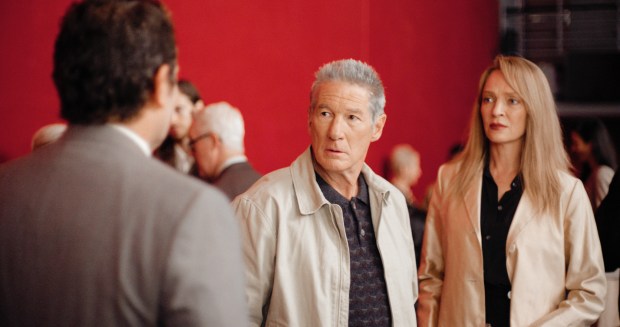Their ages vary. But a conspicuous handful of filmmaking lions in winter, or let’s say late autumn, have given us new reasons to be grateful for their work over the decades — even for the work that didn’t quite work.
Which, yes, sounds like ingratitude. But do we even want more conventional or better-behaved work from talents such as Francis Ford Coppola? Even if we’re talking about “Megalopolis”? If Clint Eastwood’s “Juror #2” gave audiences a less morally complicated courtroom drama, would that have mattered, given Warner Bros.’ butt-headed decision to plop it in less than three dozen movie theaters in the U.S.?
Coppola is 85. Eastwood is 94. Paul Schrader, whose latest film “Oh, Canada” arrives this week and is well worth seeking out, is a mere 78. Based on the 2021 Russell Banks novel “Foregone,” “Oh, Canada” is the story of a documentary filmmaker, played by Richard Gere, being interviewed near the end of his cancer-shrouded final days. In the Montreal home he shares with his wife and creative partner, played by Uma Thurman, he consents to the interview by two former students of his. Gere’s character, Leonard Fife, has no little contempt for these two, whom he calls “Mr. and Mrs. Ken Burns of Canada” with subtle disdain. As we learn over the artful dodges and layers of past and present, events imagined and/or real, Fife treats the interview as a final confession from a guarded and deceptive soul.
He’s also a hero to everyone in the room, famous for his anti-Vietnam war political activism, and for the Frederick Wiseman-like inflection of his own films’ interview techniques. The real-life filmmaker name-checked in “Oh, Canada” is documentarian Errol Morris, whose straight-to-the-lens framing of interview subjects was made possible by his Interrotron device.
In Schrader’s adaptation, Fife doesn’t want the nominal director (Michael Imperioli, a nicely finessed embodiment of a second-rate talent with first-rate airs) in his eyeline. Rather, as he struggles with hazy, self-incriminating memories of affairs, marriages, one-offs with a friend’s wife and a tense, brief reunion with the son he never knew, Fife wants only his wife, Emma — his former Goddard College student — in this metaphoric confessional.
Schrader and his editor Benjamin Rodriguez Jr. treat the memories as on-screen flashbacks spanning from 1968 to 2023. At times, Gere and Thurman appear as their decades-young selves, without any attempt to de-age them, digitally or otherwise. (Thank god, I kind of hate that stuff in any circumstance.) In other sequences from Fife’s past, Jacob Elordi portrays Fife, with sly and convincing behavioral details linking his performance to Gere’s persona.
We hear frequent voiceovers spoken by Gere about having ruined his life by age 24, at least spiritually or morally. Banks’ novel is no less devoted to a dying man’s addled but ardent attempt to come clean and own up to what has terrified him the most in the mess and joy of living: Honesty. Love. Commitment.
There are elements of “Oh, Canada” that soften Banks’ conception of Fife, from the parentage of Fife’s abandoned son to the specific qualities of Gere’s performance. It has been 44 years since Gere teamed with Schrader on “American Gigolo,” a movie made by a very different filmmaker with very different preoccupations of hetero male hollowness. It’s also clearly the same director at work, I think. And Gere remains a unique camera object, with a stunning mastery of filling a close-up with an unblinking stillness conveying feelings easier left behind.
The musical score is pretty watery, and with Schrader you always get a few lines of tortured rhetoric interrupting the good stuff. In the end, “Oh, Canada” has an extraordinarily simple idea at its core: That of a man with a movie camera, most of his life, now on the other side of the lens. Not easy. “I can’t tell the truth unless that camera’s on!” he barks at one point.
I don’t think the line from the novel made it into Schrader’s script, but it too sums up this lion-in-winter feeling of truth without triumphal Hollywood catharsis. The interview, Banks wrote, is one’s man’s “last chance to stop lying.” It’s also a “final prayer,” dramatized by the Calvinist-to-the-bone filmmaker who made sure to include that phrase in his latest devotion to final prayers and missions of redemption.
“Oh, Canada” — 3 stars (out of 4)
No MPA rating (some language and sexual material)
Running time: 1:34
How to watch: Opens in theaters Dec. 13, running 1in Chicago Dec. 13-19 at the Gene Siskel Film Center, 164 N. State St.; siskelfilmcenter.org
Michael Phillips is a Tribune critic.



